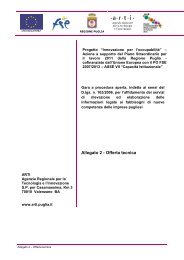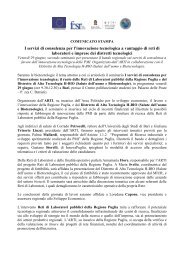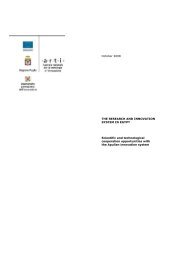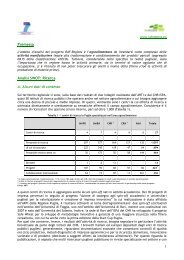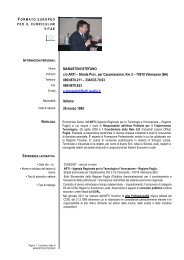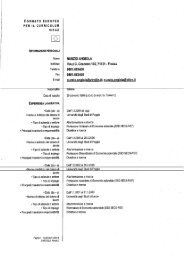the research and innovation system in egypt - ARTI Puglia
the research and innovation system in egypt - ARTI Puglia
the research and innovation system in egypt - ARTI Puglia
You also want an ePaper? Increase the reach of your titles
YUMPU automatically turns print PDFs into web optimized ePapers that Google loves.
which constituted <strong>the</strong> bulk of total domestic taxes, due to recent tax reforms. This trend is likely<br />
to gradually widen <strong>the</strong> tax base <strong>in</strong> <strong>the</strong> forthcom<strong>in</strong>g years. Revenues, however, have rema<strong>in</strong>ed<br />
more or less constant (about 21%) as a percentage of <strong>the</strong> GDP over <strong>the</strong> past few years.<br />
On <strong>the</strong> expenditures side, strong expenditure growth has rema<strong>in</strong>ed a ma<strong>in</strong> feature of<br />
<strong>the</strong> budget. This is ma<strong>in</strong>ly a result of cont<strong>in</strong>ued strong expansion of (1) <strong>the</strong> public-sector<br />
wages driven by government pledges. Wages <strong>and</strong> Compensations <strong>in</strong>creased from EGP<br />
30,5 billion (€ 7,02 billion) <strong>in</strong> FY2002 to EGP 59,6 billion (€ 7,39 billion) <strong>in</strong> FY2008; (2) high<br />
<strong>in</strong>terest payments on <strong>the</strong> public debt stock. Interest payments rose from EGP 21,8 billion<br />
(€ 5 billion) <strong>in</strong> FY2002 to EGP52,0 billion (€ 6,45 billion) <strong>in</strong> FY2008. Importantly, dramatic<br />
<strong>in</strong>crease <strong>in</strong> domestic debt which is projected to be roughly 62% of GDP <strong>in</strong> FY2008 up from<br />
58,4% <strong>in</strong> FY2002; <strong>and</strong> (3) <strong>the</strong> costs of food <strong>and</strong> energy subsidies, which rose from EGP<br />
18,0 billion (€ 4,15 billion) <strong>in</strong> FY2002 to EGP 64,5 billion (€ 8 billion) <strong>in</strong> FY2008.<br />
The overall deficit, after adjust<strong>in</strong>g for net acquisition of f<strong>in</strong>ancial assets, rema<strong>in</strong>s almost<br />
unchanged from <strong>the</strong> cash deficit. The budget’s overall deficit of EGP 43,8 billion (€ 10,07<br />
billion) or -10,2% of GDP for FY2002 has become 49,2 billion (€ 6,35 billion) <strong>in</strong> FY2007, so<br />
that is narrowed to -6,7% of GDP. Deficit is f<strong>in</strong>anced largely by domestic borrow<strong>in</strong>g <strong>and</strong><br />
revenue from privatization sales, which became a st<strong>and</strong>ard account<strong>in</strong>g practice <strong>in</strong> budget<br />
Egypt. The government aims at more sales of assets <strong>in</strong> FY2008.<br />
1.9. Exchange Rate policy<br />
The exchange rate policy is l<strong>in</strong>ked to US Dollar. With <strong>the</strong> turn of <strong>the</strong> new millennium, Egypt<br />
<strong>in</strong>troduced a managed float regime <strong>and</strong> successfully unified <strong>the</strong> Pound exchange rate visà-vis<br />
foreign currencies. Currency black markets do not exist anymore. The transition to<br />
<strong>the</strong> unified exchange rate regime was completed <strong>in</strong> December 2004. Shortly later, Egypt<br />
has notified <strong>the</strong> International Monetary Fund (IMF) that it has accepted <strong>the</strong> obligations of<br />
Article VIII, Section 2, 3, <strong>and</strong> 4 of <strong>the</strong> IMF Articles of Agreement, with effect from January<br />
2, 2005. IMF members accept<strong>in</strong>g <strong>the</strong> obligations of Article VIII undertake to refra<strong>in</strong> from<br />
impos<strong>in</strong>g restrictions on <strong>the</strong> mak<strong>in</strong>g of payments <strong>and</strong> transfers for current <strong>in</strong>ternational<br />
transactions, or from engag<strong>in</strong>g <strong>in</strong> discrim<strong>in</strong>atory currency arrangements or multiple<br />
currency practices, except with IMF approval. Egypt thus assured <strong>the</strong> <strong>in</strong>ternational<br />
community that it will pursue economic policies that will not impose restrictions on <strong>the</strong><br />
mak<strong>in</strong>g of payments <strong>and</strong> transfers for current <strong>in</strong>ternational transactions unnecessary, <strong>and</strong><br />
will contribute to a multilateral payments <strong>system</strong> free of restrictions.<br />
In <strong>the</strong> fiscal year 2004 <strong>and</strong> over most of <strong>the</strong> fiscal year 2005, <strong>the</strong> pound depreciated<br />
aga<strong>in</strong>st <strong>the</strong> US Dollar. S<strong>in</strong>ce <strong>the</strong> second half of <strong>the</strong> fiscal year 2006 until <strong>the</strong> present time,<br />
<strong>the</strong> pound gradually appreciated to EGP 5,35 per USD.<br />
1.10. Investment<br />
Egypt’s location astride trade routes l<strong>in</strong>k<strong>in</strong>g Asia, <strong>the</strong> Middle East <strong>and</strong> Europe is a key<br />
sell<strong>in</strong>g po<strong>in</strong>t when officials meet with potential <strong>in</strong>vestors. So far, <strong>the</strong> government has done<br />
well compet<strong>in</strong>g aga<strong>in</strong>st nations such as Turkey for <strong>the</strong> right to host companies look<strong>in</strong>g for<br />
an export platform to serve consumers <strong>in</strong> Africa <strong>and</strong> <strong>the</strong> Middle East.<br />
18 <strong>the</strong> <strong>research</strong> <strong>and</strong> <strong><strong>in</strong>novation</strong> <strong>system</strong> <strong>in</strong> Egypt







